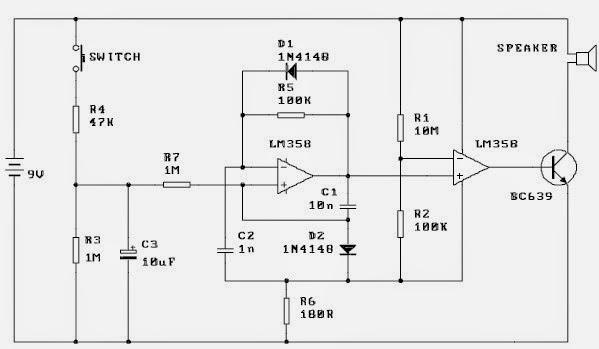This is the simple ic based Siren Alarm Circuit Diagram. This siren alarm circuit may provide the final building block in an alarm circuit using a relay to activate it. This siren circuit is very simple and is constructed using common electronic components .
Siren Alarm Circuit Diagram
Siren Alarm Circuit Diagram

When the switch is pressed C3 charges up through R4 with a time constant of 0.47 seconds and when the switch is released C3 begins a slower discharge through R7 and R3 with a time constant of about 5 seconds. The op amp 358 used in this project is set up as a voltage controlled oscillator.
When the output of the oscillator (pin 7) switches low there is a charge remaining in C1 which holds pin 5 below the switching point. Current through R7 is proportional to the control voltage on C3. This current discharges C1 causing the voltage on pin 5 to rise towards the switching point at a rate proportional to the voltage on C3. When the switching point is reached pin 7 switches high and initially pulls pin 6 high via C1. This causes the op amp to temporarily turn on hard. But C3 quickly recharges through D2 causing the voltage on pin 5 to fall below the switching point and causing the op amp to switch off again.
The positive pulse output from the op amp puts a fixed amount of charge into C2 slightly raising the potential of pin 6. This causes the potential on pin 6 to rise and assist the sharp switch off of the op amp. Also R5 & C2 delay the rise on pin 6 long enough to get a good output pulse.
When the output of the oscillator (pin 7) switches low there is a charge remaining in C1 which holds pin 5 below the switching point. Current through R7 is proportional to the control voltage on C3. This current discharges C1 causing the voltage on pin 5 to rise towards the switching point at a rate proportional to the voltage on C3. When the switching point is reached pin 7 switches high and initially pulls pin 6 high via C1. This causes the op amp to temporarily turn on hard. But C3 quickly recharges through D2 causing the voltage on pin 5 to fall below the switching point and causing the op amp to switch off again.
The positive pulse output from the op amp puts a fixed amount of charge into C2 slightly raising the potential of pin 6. This causes the potential on pin 6 to rise and assist the sharp switch off of the op amp. Also R5 & C2 delay the rise on pin 6 long enough to get a good output pulse.










No comments:
Post a Comment